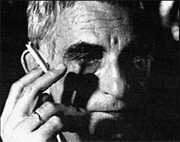|
International Retrospective: Krzysztof Kieslowski
Introduction
Master's Thesis
Movies

This year, the international retrospective of It’s All True – International Documentary Film Festival
celebrates the non-fiction works of Polish director Krzysztof Kieslowski (1941-1996). Kieslowski became
one of the most acclaimed directors of the 20th century’s last two decades with films like the TV series
“The Decalogue” (1989) and the “Three Colors” trilogy (1993/94) and, in between them “The Double Life
of Véronique” (1991). Over a decade after his premature death, the first Kieslowski, the one of his initial
phase as a documaker, remains a fundamental continent that remains unkown.
In documentary film, Kieslowski was as innovative and accurate in the structure of his narratives as he was
in fiction. He changed devices and strategies, tested boundaries, established himself as a fully-fledged
creator. Regardless of the genre, his focus was always closed in on the individuality of each human existance
and on the power of chance. His first films deal essentialy with daily life in socialist Poland. He portrays
ordinary men and women, common workers, dull burocrats. “Seize gestures and moments – this is the
interest of documentary film and also its trap”, said Kieslowski. “The more I got closer to the heart, the
intimacy of the characters, the more afraid I was”. Therefore, it was not surprising that Kieslowski affirmed
his definitive transition from documentary to fiction was due to ethical issues. “I fear real tears. In fact, I don’t
know if I have the right to film them.” The game was different in the fiction stage. True lies interested him.
From the 21 non-fiction short and medium-length films he directed between the mid 60’s and the early
80’s, It’s All True, in collaboration with the Consulate of Poland and Film Polski, presents 17 works followed
by three recent documentaries about the filmmaker. Here is the mystery of life according to KK.
AMIR LABAKI
|
 |




